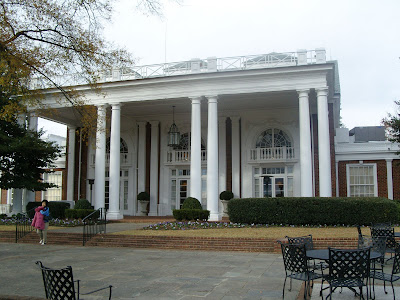For the first time during Thanksgiving week, we got all dressed up - my father in a beautiful dark grey suit, my mother in a pair of knee-high black boots under a swingy black skirt with a gorgeous, deep-colored, tapestry jacket, and me in a pair of unconventionally cool and large-buckled high heels with a black knee-length pencil skirt, a tailored sweatshirt material jacket, accented with a multicolored scarf I'd bought in Shanghai. We looked awesome. We drove our shiny black Prius over to "The Club" while I snapped pictures of the grand, brick entryway and the gargantuan golf course with members' colonial homes overlooking it from the edges (presumably for this blog).



Just before getting out of the car, I made a joke about the Jews descending upon the old southern establishment. My father admonished me for it. No apologies from me, this place didn't allow Jews, blacks or other unconventional minorities into their membership until the 1990's. Even then, the one or two Jewish families that were allowed to join were assimilated, and/or converted whose roots had been in Richmond since the 1800's. And here we were, three real, 2nd/3rd generation Jewish people, waiting all dressed up to have lunch with a few of the proud members of this historic establishment.
They were waiting for us in the lobby. Each woman in her version of her Christmas-best red sweater, puffed and curled thinning blonde hair, neatly tied matching red silk scarves, and old Richmond accents to the nines. The men looked pretty normal - in fact, my dad was dressed quite appropriately given their fashion choices. For me and my mom, though, I couldn't decide if I felt vampy and frizzy around these people in our dark outfits with our dark, thick, overly-lush hair, or regal and proud to have been invited and arrived more stylish in the "cosmopolitan sense" than they. We were immediately introduced to the other guests of honor, a couple that had just returned from a three month posting in Shanghai.
"Are you John Doe who lived on the corner of Oak Lane and Kenmore? My brother used to go to your house all the time, and I used to play with your sister when I was a kid! Before my mother died, she used to play bridge with your mother ... do you remember my mother, her name was ..." My mother's excitement and monologue came to a decelerating end as she noticed John was being completely nonresponsive and attempting to change his body position so as not to face my mom. The hosts unhesitatingly swept us off to the main dining room.
We were seated at a round table amongst a high class Shoney's-like decor. I bet you didn't think there was ever such a thing. It looked like the place hadn't been changed since the 1970's, and neither had the menu. My vegetarian parents opted for the salad bar. I got a Waldorf Salad. I was placed between the recently returned couple - John Doe and his wife Jane. The host sat across from us and began the conversation.
"Now Kerin, I know you lived in China for quite some time, as did the Doe's. Now, tell me, did you live amongst the Chinese while you were there?"
"Excuse me?"
"Well, did you live AMONGST the CHaaaahhhNESE, if you know what I mean."
I did my best at answering appropriately what seemed to be the most ridiculous question ever. I wanted to ask her if she lived amongst Americans, but stopped myself with a mouthful of apples and walnuts. Subsequently, the couple took over. I first spent a bit of time talking to Jane - who was wonderful - originally from "The North" she moved to "The South" when she married her husband (once Jewish but no longer involved in it, so please don't mention to him, ok?), and jumped at the opportunity to live in Shanghai and New York when her husband's law firm offered him postings in both places.
John, however, began his conversation with me by telling me the networks he belonged to in Shanghai - the Harvard Law School alumni club, the Wharton alumni club, etc etc. He then recounted his academic accolades to me, reminding me that both those Ivy League schools were the MOST well-known schools in China and he was treated like a king there for it. I mentioned that I was the head of the Stanford alumni association while I was there, he shrugged it off saying that the Chinese unfortunately didn't know what Stanford was. Ummm.... another bite of apple and walnuts stopped me. He then started to teach me Chinese, show off his newly acquired language skills, tell me all about business ethics and what the Chinese are like. Oy Vay.
Lunch, finally, ended 2.5 hours later. It was actually pretty fun. I promised an email of places to go and people to meet for the couple when they return to Shanghai for a second stint this spring.
As my parents and I jumped into the car my mother made an interesting comment ... "That Old Richmond family, do you think it was any coincidence that she invited two "Jewish" families who had China connections?" Here in the Old South, once you've got a label, you've always got that label... Harvard or Wharton or Stanford or whatever it is, we can either choose to leave this Old Money society for a place where we'll be accepted, or fight for acceptance for the rest of our lives. For me and my family, we've left it either physically or emotionally. I think we are very lucky.